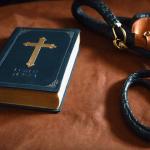The Adventurous Lectionary – Eleventh Sunday after Pentecost – August 4, 2024
2 Samuel 11:26-12:13a
Psalm 51:1-12
Ephesians 4:1-16
John 6:24-35
This Sunday’s readings focus on the realities of sin and grace. Although God creates a universe of beauty – a very good world – sin is one of the most pressing realities of scripture and our daily lives, both at the personal and communal spheres. Despite the original goodness of life and our own creation in God’s image, wee can’t evade recognizing our own brokenness or escape the impact of our actions. Our recognition of our fallibility opens us to grace beyond our efforts; the transformative energy emerging from a grace and power greater than our own. We may not feel we deserve grace, but God’s grace can give us a new life and new orientation in the midst of our brokenness. God is not out to get us; God is out to love us.
The encounter of Nathan and David describes the consequences of intentional royal impropriety. It could have been ripped from the headlines of the current presidential campaign, court cases involving the former president or current events in today’s news. As events unfold in the personal and public spheres, the issue is not always the sin but the cover up and David, like many other politicians, was guilty on both accounts. His sexual impropriety led to Bathsheba’s pregnancy and then he ordered the “murder” of Uriah to cover up his misdeed. Bathsheba may have “consented,” but it is clear that the option of saying “no” to the king would come with severe negative consequences. Indeed, the power differential between David and Bathsheba may have indeed rendered their sexual relationship “non-consensual” and bounding on rape!
The prophet convicts the king of his misdeed and tells him that there will be hell to pay. David’s hidden and intentional sin has consequences. There will be conflict and war till the end of his reign. What was hidden will be revealed in political strife. Whether we speak of allegations by Monica Lewinski or Stormy Daniels, the misconduct of pastors and political leaders tarnishes their reputations and damages the nation.
Of course, in a time in which many Christians tout the virtues of traditional marriage, we need to note that David’s “biblical marriage” involved many (at least eight) wives and lovers. Polygamy was the norm, especially among the powerful whose power and wealth apparently required a retinue of spouses, arranged, desired, and compelled. While this may not be a main point of today’s scripture, it is important to note that the conservative desire to institute “biblical marriage” – and their condemnation of the LGBTQ+ community – is, in fact, an illusory and misplaced, even a dangerous, quest. There is no one norm of biblical marriage and like so many other politically charged issues – abortion, physician assisted suicide, suicide, and homosexuality – there is little or no biblical guidance for contemporary behaviors. We must seek to be faithful to the ways of love as we open to God’s guidance in the sacrament of the present moment. (Pierre de Caussade) Love and affirmation matter regardless of the shape of our marriages.
Still, this passage convicts us all, even if our “sins” are minor, unintentional, and motivated by love. Thomas Merton speaks of the “guilty bystander” and all of us, whether in terms of our investments, support of national policies, indifference, or omissions, leave indirectly a trail of tears. None of us is innocent, though some of our “sins” remain hidden or leave little damage in their wake. Nevertheless all of us need healing grace to begin again with new and transformed lives.
Often seen as David’s confession of sin, Psalm 51 realistically describes the anguish we feel when our brokenness is revealed to us. Unable to hide from ourselves, we experience our own guilt and, perhaps, shame at deeds done and not done. We all need to confess our complicity in the evils of the time; even “good people” may be complicit in the pain of others. Our inner life may be filled with temptation and we may be tossed about our own prejudices and negativity. As the Psalmist asserts, we need a new and clean heart. Even the best of us, acting innocently, need to experience inner transformation, a healing of the spirit, reflected in our outer actions.
As progressives, we may rightly object to the notion of being born in sin, as the Psalm suggests. There is no need to hold a literal doctrine of original sin to understand this passage. In fact, sin is not inherent in our natures any more than goodness. Indeed, if God is ever-present, then goodness may have the upper hand. God is constantly present in our lives and providing possibilities for each moment. However, we know that we are the imperfect children of imperfect parents born into an imperfect world. While I believe that we are born as God’s beloved children, worthy of love, it is also true none of us can escape the relational nature of sin, the brokenness of the world and our families. The Psalmist seeks wholeness in all the ambiguity of life. Fallible and imperfect, the Psalmist pleads for an abundant blessing that will allow him to be faithful to God from this day forth.
As Luther asserted, we are always simultaneously sinners and righteous. We need mercy, a new heart, and a healed spirit. We are all standing in the need of grace. Even the righteous among us need forgiveness and grace. This is the interdependence of grace that both reveals and heals, and enables us to escape the illusions that our goodness and righteousness is somehow self-made.
Grace inspires us to live a life worthy of our calling as Christ’s companions and followers. Following Jesus requires us to be agents of unity and reconciliation, lived out with our unique and particular gifts. Our calling is to embody the full stature of Christ, taking our roles within the body of Christ.
God’s vision is to fill all things in Christ and to fill each of us with divine wisdom and power that we may fully incarnate God’s love in our lives. God’s grace abounds. God’s call inspires us to respond by devoting our lives in their entirety to fulfilling God’s vision, bringing health and wholeness to the world and the body of Christ. As recipients of grace, we become grace-givers, bringing healing and forgiveness to our world.
John’s Gospel describes God’s abundant provision. Christ is the bread of life. Connected to him, our lives are full and we fulfill our destinies as God’s beloved. Inspired by Jesus’ miraculous feeding of a multitude, Jesus’ followers ask “What must we do to perform the works of God?” Our faith opens us to God’s vision of wholeness, awakening new possibilities for divine activity in our lives. Awakened to God’s grace, our spiritual hungers and thirsts will be satisfied in the midst of challenge and uncertainty.
Jesus is the “bread of life” and God’s resources are always available to nourish, transform, and sustain. Even when we fall, God is there is pick us up, help us face the consequences of our actions, and find grace to move forward in love and service.
+++
Bruce Epperly is a pastor, professor, and author of over eighty books, “Jesus: Mystic, Healer, and Prophet,” “Process and Politics,” Spirituality, Simplicity, and Service: The Timeless Wisdom of Francis, Clare, and Bonaventure,” and “The Elephant is Running: Process and Open and Relational Theology and Religious Pluralism.” His most recent books are “The God of Tomorrow: Whitehead and Teilhard on Metaphysics, Mysticism, and Mission” and “Head, Heart, and Hands: An Introduction to St. Bonaventure.”














